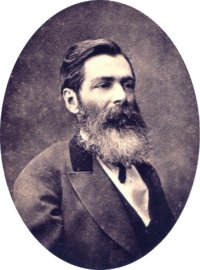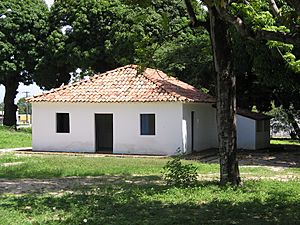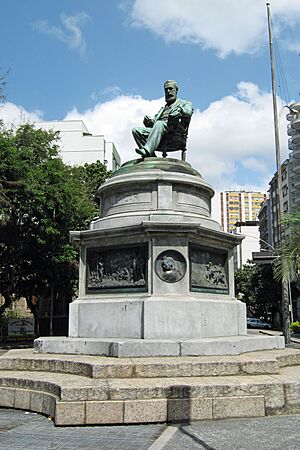José de Alencar facts for kids
Quick facts for kids
José de Alencar
|
|
|---|---|

José de Alencar, c. 1870
|
|
| Born | José Martiniano de Alencar May 1, 1829 Fortaleza, Empire of Brazil |
| Died | December 12, 1877 (aged 48) Rio de Janeiro, Empire of Brazil |
| Pen name | Erasmo Ig |
| Occupation | Lawyer, politician, orator, novelist, dramatist |
| Nationality | Brazilian |
| Alma mater | University of São Paulo |
| Literary movement | Romanticism |
| Notable works | O Guarani, Senhora, Lucíola, Iracema, Ubirajara |
| Spouse | Georgina Augusta Cochrane |
| Children | Augusto de Alencar, Mário de Alencar |
| Relatives | José Martiniano Pereira de Alencar, Leonel Martiniano de Alencar |
| Signature | |
 |
|
José Martiniano de Alencar (born May 1, 1829 – died December 12, 1877) was a famous Brazilian writer. He was a lawyer, a politician, and a great speaker. He also wrote many novels and plays.
José de Alencar is known as one of the most important Brazilian writers of the 1800s. He was a key figure in a style of writing called Romanticism. He also helped create a literary movement called "Indianism." This style focused on Brazil's native peoples and their culture. Sometimes, he used the pen name Erasmo when he wrote. He is honored as the patron of the 23rd chair in the Brazilian Academy of Letters.
Contents
José de Alencar's Life Story

José Martiniano de Alencar was born in Messejana, a neighborhood in Fortaleza, Ceará. His birthday was May 1, 1829. His father, José Martiniano Pereira de Alencar, was a politician. His mother was Ana Josefina de Alencar, who was also his father's cousin.
His family was very wealthy and powerful in Northeastern Brazil. His grandmother, Barbara Pereira de Alencar, was a famous landowner. She was known as a heroine from the Pernambucan Revolution.
Early Life and Education
In 1844, José de Alencar moved to São Paulo. He studied Law at the Faculdade de Direito da Universidade de São Paulo. He finished his law degree in 1850. After that, he started his career as a lawyer in Rio de Janeiro.
Writing Career Begins
A friend, Francisco Otaviano, invited him to write for a newspaper called Correio Mercantil. He also wrote many short articles, called chronicles, for other newspapers. These included the Diário do Rio de Janeiro and the Jornal do Commercio. In 1874, Alencar collected all these articles into a book. He named the book Ao Correr da Pena.
In 1856, Alencar became very well-known. He wrote articles for the Diário do Rio de Janeiro under the name Ig. These articles were called Cartas sobre A Confederação dos Tamoios. In them, he strongly criticized a poem by Gonçalves de Magalhães. Even the Brazilian Emperor Pedro II joined in this debate.
First Novels and Success
Also in 1856, Alencar published his first novel, Cinco Minutos. It was released in parts, like a series, which was called a feuilleton. This book was very popular. The next year, his most famous novel, O Guarani, came out. Thirteen years later, a Brazilian composer named Antônio Carlos Gomes turned O Guarani into a famous opera called Il Guarany.
O Guarani was the first book in what is sometimes called Alencar's "Indianist Trilogy." This was a series of three novels. They focused on the beginnings of the Brazilian nation. They also explored its native peoples and their culture. The other two novels in this series were Iracema (published in 1865) and Ubirajara (published in 1874). Even though they are called a trilogy, the stories in these three books are not directly connected.

Political Career and Family Life
Alencar was a member of the Conservative Party of Brazil. He was chosen as a general deputy for Ceará. From 1868 to 1870, he served as the Brazilian Minister of Justice. He had strong opinions on many political topics of his time. He wanted to become a senator, but Emperor Pedro II never appointed him. The Emperor said Alencar was too young. Feeling disappointed, Alencar later left politics.
He was very good friends with another famous writer, Machado de Assis. In 1866, Assis wrote an article praising Alencar's novel Iracema. He compared Alencar's Indianist works to those of Gonçalves Dias. Assis said that "Alencar was in prose what Dias was in poetry." When Assis started the Brazilian Academy of Letters in 1897, he chose Alencar to be the patron of his own chair.
In 1864, José de Alencar married Georgina Augusta Cochrane. She was the daughter of a British aristocrat. They had six children together. Their children were Augusto, Clarisse, Ceci, Elisa, Mário, and Adélia. Augusto later became the Brazilian Minister of External Relations in 1919. He was also the Brazilian ambassador to the United States. Mário became a journalist and writer, and a member of the Brazilian Academy of Letters.
Later Years and Legacy
José de Alencar passed away in Rio de Janeiro in 1877. He died from tuberculosis. A theater in Fortaleza, called the Theatro José de Alencar, was named in his honor. His writings often showed the influence of his Roman Catholic faith.
José de Alencar's Works
Novels
- Cinco Minutos (1856)
- A Viuvinha (1857)
- O Guarani (1857)
- Lucíola (1862)
- Diva (1864)
- Iracema (1865)
- As Minas de Prata (1865 — 1866)
- O Gaúcho (1870)
- A Pata da Gazela (1870)
- O Tronco do Ipê (1871)
- A Guerra dos Mascates (1871 — 1873)
- Til (1871)
- Sonhos d'Ouro (1872)
- Alfarrábios (1873)
- Ubirajara (1874)
- O Sertanejo (1875)
- Senhora (1875)
- Encarnação (1893 — posthumous)
Theatre Plays
- O Crédito (1857)
- Verso e Reverso (1857)
- O Demônio Familiar (1857)
- As Asas de um Anjo (1858)
- Mãe (1860)
- A Expiação (1867)
- O Jesuíta (1875)
Chronicles
- Ao Correr da Pena (1874)
Autobiography
- Como e Por Que sou Romancista (1873)
Critics and Polemics
- Cartas sobre A Confederação dos Tamoios (1856)
- Cartas Políticas de Erasmo (1865 — 1866)
- O Sistema Representativo (1866)
See also
 In Spanish: José de Alencar para niños
In Spanish: José de Alencar para niños
 | Chris Smalls |
 | Fred Hampton |
 | Ralph Abernathy |

